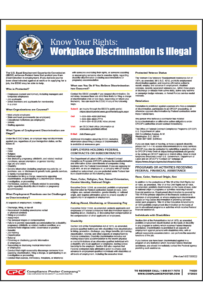 Although opinions differ as to the cause, the wage gap between male and female workers persists even today – on average, women earn roughly 80% of what men earn over the course of a lifetime. Some equality advocates have argued that the common employer practice of using a new hire’s previous salary to determine their starting pay perpetuates the problem even if it doesn’t directly cause it, because it means that one sexist pay practice can affect a person’s salary through the course of their career.
Although opinions differ as to the cause, the wage gap between male and female workers persists even today – on average, women earn roughly 80% of what men earn over the course of a lifetime. Some equality advocates have argued that the common employer practice of using a new hire’s previous salary to determine their starting pay perpetuates the problem even if it doesn’t directly cause it, because it means that one sexist pay practice can affect a person’s salary through the course of their career.
In an attempt to promote pay equity, states and municipalities have recently begun passing laws which prohibit employers from requiring a new employee to provide information on their previous salary. According to at least one federal appellate court, however, the practice is already illegal under federal law. On April 9 – one day before 2018’s Equal Pay Day – the 9th Circuit released a decision stating that any use of salary history when determining a new hire’s wages is a violation of the Equal Pay Act of 1963.
WHAT IS THE EQUAL PAY ACT?
The Equal Pay Act is a subsection of the Fair Labor Standards Act, the federal law which sets minimum standards for employee wages and overtime requirements. Signed into law by President Kennedy in 1963, the Equal Pay Act prohibits employers from discriminating on the basis of sex by paying unequal wages to employees of different genders for their “equal work.” Equal work is defined within the Act as work which is performed on jobs requiring equal skill, effort, and responsibility, and which is performed under similar working conditions.
 The law specifies that pay disparity between employees of different genders is not considered discriminatory if it is based not on sex, but instead on one of the following factors:
The law specifies that pay disparity between employees of different genders is not considered discriminatory if it is based not on sex, but instead on one of the following factors:
- A seniority system;
- A merit system;
- A system which measures earnings by quantity or quality of production; or
- A differential based on any other factor other than sex.
Although the law does not explicitly define “any other factor,” the Equal Employment Opportunity Commission (EEOC) provides a Compliance Manual which clarifies the agency’s enforcement standards. This guidance specifies that an employer “must show that the factor is related to job requirements or otherwise is beneficial to the employer’s business.” The citation for this aspect of the guidance is the 9th Circuit holding on the 1982 case Kouda v. Allstate Insurance, which has been overruled by this new decision.
9th CIRCUIT SAYS: SALARY HISTORY IS BANNED
In the 9th Circuit case, Rizo v. Yovino, the employer did not explicitly determine employee salaries on the basis of sex. Instead, a new hire’s salary was set by adding 5% to the applicant’s prior salary, and then placing the new employee on the corresponding level of a stepped hiring schedule with 10 levels. A female employee, Aileen Rizo, was placed on the very bottom (step 1 of level 1) of the hiring schedule. She filed a complaint when she discovered that her male coworkers were placed on higher salary steps at their time of hire.
Rizo’s employer argued that its pay practices did not violate the Equal Pay Act because the pay differential Rizo experienced was based a “factor other than sex;” namely, the employee’s prior salary. The Court, however, concluded “unhesitatingly” that, as with the other systems mentioned in the statute such as seniority or merit, a valid pay differential must be “limited to legitimate, job-related factors” such as experience, education, or previous job performance.
In reaching this conclusion, the Court referred to the “clear intent and purpose” of the Equal Pay Act to correct a “serious and endemic” pay differential which was acknowledged to exist between female and male workers. The majority points out that, “At the time of the passage of the Act, an employee’s prior pay would have reflected a discriminatory marketplace that valued the equal work of one sex over another.” As such, it is “inconceivable” that Congress would create an exception to the Act which would inevitably perpetuate the very disparities the Act was intended to correct – “disparities that Congress declared as not only related to sex but caused by sex.”
Most notably, the majority opinion, authored by Judge Reinhardt before his death in early April, held that prior salary “alone or in combination with other factors cannot justify a wage differential” (emphasis added). In this, the Court broke with its previous holding in Kouda which held that it was permissible to use a new hire’s prior salary to determine their new salary if it is used “reasonably” and in order to “effectuate some business policy.”
 In concurrence, some judges disagreed with this this hard-line stance, but the majority held that in practice, salary is simply too poorly-correlated to legitimate factors to be considered “job-related” in and of itself. To the extent that an employee’s prior salary does accurately reflect her training, education, or ability, the employer “must point directly to the underlying factors for which prior salary is a rough proxy… if it is to prove its wage differential is justified.”
In concurrence, some judges disagreed with this this hard-line stance, but the majority held that in practice, salary is simply too poorly-correlated to legitimate factors to be considered “job-related” in and of itself. To the extent that an employee’s prior salary does accurately reflect her training, education, or ability, the employer “must point directly to the underlying factors for which prior salary is a rough proxy… if it is to prove its wage differential is justified.”
The majority additionally clarified that the “other factor” must be specifically job-related rather than business-related, pointing to the legislative history of the Equal Right Act which suggests that the “other factor” exception was added to cover a wide breadth of legitimate factors which differ according to industry, such as bona fide job classification programs. The Court stated that allowing business-related factors to serve as a legitimate defense creates “too many improper justifications for avoiding the strictures of the Act.” The majority also observed the Supreme Court has established in multiple cases that employers cannot pay women less, or charge women more for benefits, simply because it makes financial sense for the business.
WHAT DO EMPLOYERS NEED TO KNOW?
The 9th Circuit decision covers employers operating in Alaska, Arizona, California, Hawaii, Idaho, Montana, Nevada, Oregon, and Washington. For many employers operating in these states, this decision will likely have a new and profound effect on the hiring process. California, Oregon, and Washington, however, have recently passed laws which prohibit employers from inquiring about a potential employee’s salary history during the hiring process.
Although the majority declared that the Court did not intend to rule on the degree to which “past salary may play a role in the course of individualized salary negotiation,” several judges, while concurring with the judgment, expressed concern that the hard-line stance in the decision would stifle legitimate uses of prior salary history, such as those authorized by California and Oregon law. The California law allows a job applicant to voluntarily disclose their previous salary, and an employer to use that disclosure to determine a salary offer. Oregon’s current law allows an employer to confirm a new hire’s previous salary with written consent of the employee, although only after the employer has made an offer of employment which included compensation.(Additional provisions of the pay equity law go into effect on January 1, 2019.)
By contrast, the Washington law, which goes into effect on June 7, 2018, disallows employers from using salary history as a defense for a pay differential.
Employers who are covered by the 9th Circuit should review their hiring processes and, in cases of concern, consult an employment lawyer to ensure that their interactions with a new hire’s salary history are compliant with the Court’s interpretation of prohibited actions. As a reminder, CPC is not empowered to provided legal advice to employers or employees. You can, however, follow us on social media or subscribe to this blog to keep up with labor law and posting compliance news.
